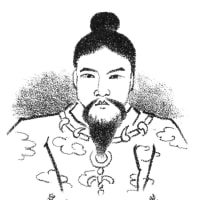『日本書紀』孝徳天皇 20
復有見言不見、不見言見、聞言不聞、不聞言聞。都無正語正見、巧詐者多。復有奴婢、欺主貧困、自託勢家求活、勢家仍强留買不送本主者多。復有妻妾、爲夫被放之、日經年之後適他、恆理。而此前夫、三四年後、貪求後夫財物爲己利者甚衆。復有恃勢之男、浪要他女、而未納際女自適人、其浪要者嗔求兩家財物爲己利者甚衆。復有亡夫之婦、若經十年及廿年適人爲婦、幷未嫁之女始適人時、於是、妬斯夫婦使祓除多。復有爲妻被嫌離者、特由慙愧所惱、强爲事瑕之婢事瑕、此云居騰作柯。復有屢嫌己婦姧他、好向官司請決。假使得明三證、而倶顯陳、然後可諮。詎生浪訴。復有被役邊畔之民、事了還鄕之日、忽然得疾臥死路頭、於是、路頭之家乃謂之曰、何故使人死於余路。因留死者友伴、强使祓除。由是、兄雖臥死於路、其弟不收者多。復有百姓溺死於河、逢者乃謂之曰、何故於我使遇溺人。因留溺者友伴、强使祓除。由是、兄雖溺死於河、其弟不救者衆。復有被役之民路頭炊飯、於是、路頭之家乃謂之曰、何故任情炊飯余路、强使祓除。復有百姓就他借甑炊飯、其甑觸物而覆、於是、甑主乃使祓除。如此等類、愚俗所染。今悉除斷、勿使復爲。
≪英訳≫
There were also those who, despite having seen something, claimed they had not seen it, or conversely, said they had seen something when they had not. Likewise, there were people who, though having heard something, claimed not to have heard it, or, without hearing, said they had. Thus, there was no correctness in speech or perception, and many excelled in deceit.
Furthermore, there were cases where servants (奴婢, nuhi), abandoning their impoverished masters, sought to attach themselves to powerful families in pursuit of a better life. Those powerful households, knowing the circumstances, often kept the servants without paying compensation to the original masters.
There were also wives and concubines (妻妾, saishō) who, having been cast off by their husbands, would, after some years, marry others — a natural course of events. Yet previous husbands, even three or four years later, would often covet and seize the wealth of the new husbands for their own gain.
Moreover, there were men relying on their social influence who would make improper advances on others’ daughters. If, before the marriage could be formalized, the woman married another man, these men would become enraged and extort wealth from both families for their own profit.
There were also widows (亡夫之婦, bōfu no tsuma) who, after ten or twenty years, remarried, or women who married for the first time, only to be subjected to the jealousy of others, who then forced them to perform purification rites (祓除, harae) as a form of compensation.
Furthermore, there were husbands who, after being disliked and separated by their wives, would, out of shame and anger, falsely claim that the separation was due to the wife’s misconduct, and degrade them to the status of “Kotosaka no Menoko” (事瑕之婢, kotosaka no menoko) — female servants punished for violating norms.
There were also those who, baselessly suspecting their wives of adultery, would hastily appeal to the authorities (官司, kanshi) for judgment. Even if there were three clear witnesses, one should first have them all testify publicly before consulting the authorities. Frivolous accusations must not arise.
In addition, when laborers (被役之民, hi-eki no tami) serving in border regions finished their assignments and returned to their hometowns, some fell ill and died along the roadsides. Households along the roadside would then say, “Why was someone allowed to die near my home?” and force the deceased’s companions to perform purification rites. Consequently, there were many cases where even if a brother died by the roadside, his surviving brother would refuse to care for him.
Similarly, when commoners (百姓, hyakushō 一般民) drowned in rivers, those who encountered the bodies would say, “Why must I come across a drowned person?” and would force the drowned person’s companions to perform purification rites. As a result, many would not even attempt to save their own brothers if they were drowning.
Also, if a laborer cooked rice near someone’s house while traveling, the householder would complain, “Why did you cook rice near my house without permission?” and demand purification rites.
Furthermore, if someone borrowed a rice steamer (甑, koshiki) and accidentally toppled it by touching something, the owner would immediately demand purification.
All of these practices were foolish customs of the ignorant populace. From now on, they are to be entirely abolished, and must never be allowed to happen again.
〔The Emperor ordered it.〕
≪この英文の和訳≫
また、物事を実際に見たにもかかわらず「見なかった」と言い、あるいは見てもいないのに「見た」と言う者があった。さらには、聞いたにもかかわらず「聞かなかった」と言い、聞いてもいないのに「聞いた」と言う者もあった。このように、正しく言葉を述べたり正しく物事を見聞きする者はなく、巧妙に偽りを弄する者が多かった。
また、奴婢(ぬひ)の身分にある者が、主人の家が貧しくなるのを見限り、富裕な家に自ら身を寄せて生活を求めることがあった。勢力ある家は、その事情を知りながらこれらを自家に留め置き、本来の主人に代価を支払わないことも多かった。
さらに、妻妾(さいしょう)が夫に離縁され、年月を経たのち他家に嫁ぐのは常の理であったが、前の夫が三、四年を経た後に、後の夫の財物を貪って己の利益とする者も多かった。
また、権勢を頼みとする男が、勝手に他人の娘と契り、まだ正式に迎えぬうちに娘が他家に嫁ぐと、これを怒り、両家の財物を奪って己が利とする者も多かった。
また、亡夫(ぼうふ)を持つ婦人が十年、二十年を経て他人の妻となった場合や、初めて嫁ぐ娘に対しても、嫉妬して祓除(はらえ)を強要することがあった。
また、妻に嫌われ離縁された夫が、恥辱のあまり怒り、無理に離縁を自らの意思であるかのように装い、妻を事瑕之婢(ことさかのめのこ 掟に背いて婢に落とされた女)とする例も見られた。
さらには、自らの妻が他人と密通したと疑い、軽率に官司(かんし 役所)に訴えて裁きを求める者もあった。たとえ明白な三人の証人があったとしても、まずは皆で事実を明らかに申し述べた上で、しかる後に官に諮るべきであり、軽々しく訴えを起こすべきではなかった。
また、辺境に従事する民(被役之民 ひえきのたみ)が任務を終えて郷里に帰る途中、病に伏して路上で死ぬことがあった。このとき、路傍の家の者は、「何故に我が家の近くで人を死なせたのか」と責め、死者の同行者(友伴)に祓除(はらえ)を強要した。そのため、たとえ兄が道中で倒れても、弟がこれを看取らない例が多かった。
また、百姓(一般民)が河で溺死したとき、これを見つけた者が「何故、我に溺死者を見せたのか」と責め、死者の同行者(友伴)に祓除(はらえ)を強いることがあった。このため、たとえ兄が河で溺れていても、弟が救助しようとしないことが多かった。
さらに、役民が旅の途中で路傍の家の付近で炊事をすると、家の者が「何故勝手に我が家の近くで飯を炊くのか」と言って祓除(はらえ)を強要した。
また、他人から甑(こしき 蒸し器)を借りて飯を炊いたところ、甑が何かに触れて倒れただけで、その持ち主が祓除(はらえ)を要求することもあった。
このような愚かな風習は、無知な民が染まった悪習である。今、これらをすべて取り除き、二度と行わせてはならぬ〔と天皇(すめらみこと)が命じられたのである〕。
令和7年4月28日(月) 2025














